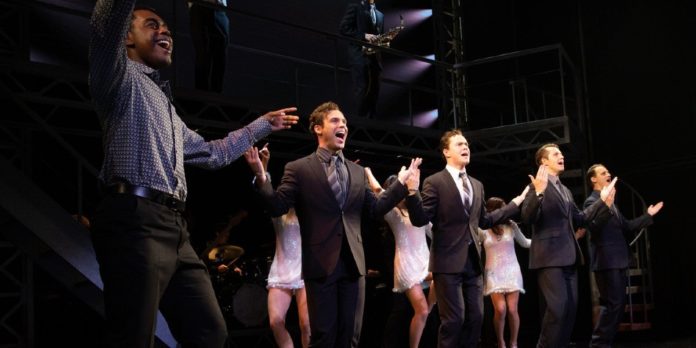
The gorgeously revamped Trafalgar Theatre (formerly Trafalgar Studios) christens its new auditorium with an old favourite: 2005 biographical jukebox musical Jersey Boys, which last ran in the West End from 2008-2017. Well, the boys are back in town – a strong lure for those audiences still working their way back to theatre.
Marshall Brickman and Rick Elice’s show makes a virtue out of the Four Seasons members’ conflicting recollections of their rise to fame and subsequent acrimonious split. The tale is told from multiple points of view, although the live-wire founder Tommy DeVito arguably dominates proceedings – until (a plot necessity but an unfortunate one) he disappears in the second half of the show.
Tommy clues us in to life growing up in 1950s New Jersey. Neighbourhood guys like him are in and out of prison all the time, with few other prospects. But when he joins forces with Frankie Valli, possessed of an angelic falsetto, talented bass player Nick Massi, and the boy wonder composer Bob Gaudio, the combination is magic. The first time that the quartet’s voices blend perfectly together under a street light is spine-tingling.
But, happily for the drama, success doesn’t come easy. Part of it is an identity crisis, with the band constantly changing names, and radio DJs unsure if they’re a Black group or one led by a female singer. There’s also tension immediately between band members: Tommy hustles for them, but is also an unreliable gambling addict who gets in deep with the mob, and he feels threatened by the business-savvy Bob’s increasing influence over Frankie, who Tommy considers his “little brother”.
The shifting power dynamics and the tussle over what it means to be a man – whether a provider, a boss, or a loyal friend – form the backbone of the story. But, though the book does challenge Tommy’s blinkered world view, there’s a misty nostalgia for this kind of tough-guy masculinity, when you lived by a code, made deals with a handshake, and settled disputes with your fists. It echoes the Four Seasons’ view of themselves as the hard-scrabble working man’s band – in contrast to those arty Beatles.
More interesting than that questionable hagiography are quirky details like Nick and Frankie having to break into a church to rehearse their harmonies, Frankie making a mobster weep over his late mother, or the fact that a teenage Joe Pesci (later an Oscar-winning actor) was the one who brought Bob into the group.
What about the women, you may ask? Well, the show certainly doesn’t. They occasionally drift into dismal view, as mothers, wives, hookers, or daughters, always from the perspective of a man – though kudos to Melanie Bright for attempting to breathe life into Frankie’s tenacious wife, Mary Delgado. There’s also a tiresomely camp portrait of a supporting gay character.
Still, what the audience is really here for is the music, and there’s no disputing that the Four Seasons’ back catalogue is a wondrous thing. The hits just keep coming: “Sherry,” “Big Girls Don’t Cry,” “December 1963 (Oh What a Night),” “Beggin’,” “Lets Hang On,” “Bye Bye Baby” – and, once Frankie goes solo, the show-stopping “Can’t Take My Eyes Off You.” Benjamin Yates brings swagger to brash wise guy Tommy, who always has a chip on his shoulder, while Karl James Wilson is an amusingly fastidious Nick and Adam Bailey a quiet but resolutely ambitious Bob – all providing smooth vocals and synchronised moves, too (slick choreography by Sergio Trujillo). And it’s a star-making West End debut for Ben Joyce, who not only evokes Valli’s exceptional voice, but supplies fervent passion and a heartbreaking gradual disillusionment.
This pared-back, Off-Broadway version of Des McAnuff’s staging works beautifully in the smaller venue. It whizzes efficiently between the short scenes and multiple locations, thanks to an industrious ensemble, minimal props, and good use of a multi-level scaffold. A video screen on the back wall showing Roy Lichtenstein’s pop art is a witty way to frame the action and tie it into the era.
Jersey Boys isn’t the most revolutionary programming, and I really do hope we see more original musicals emerging post-pandemic rather than just jukebox revivals, but you can’t fault the sheer entertainment value of this show. Oh what a night indeed.
Jersey Boys is at Trafalgar Theatre. Book Jersey Boys tickets on LondonTheatre.co.uk.
Photo credit: Jersey Boys (Photo by Piers Allardyce)








